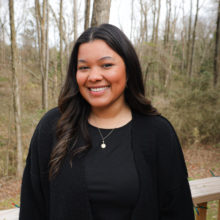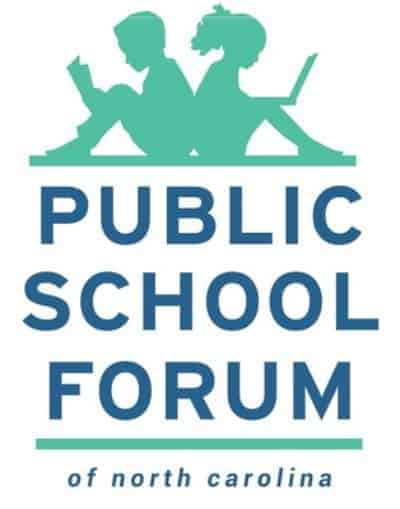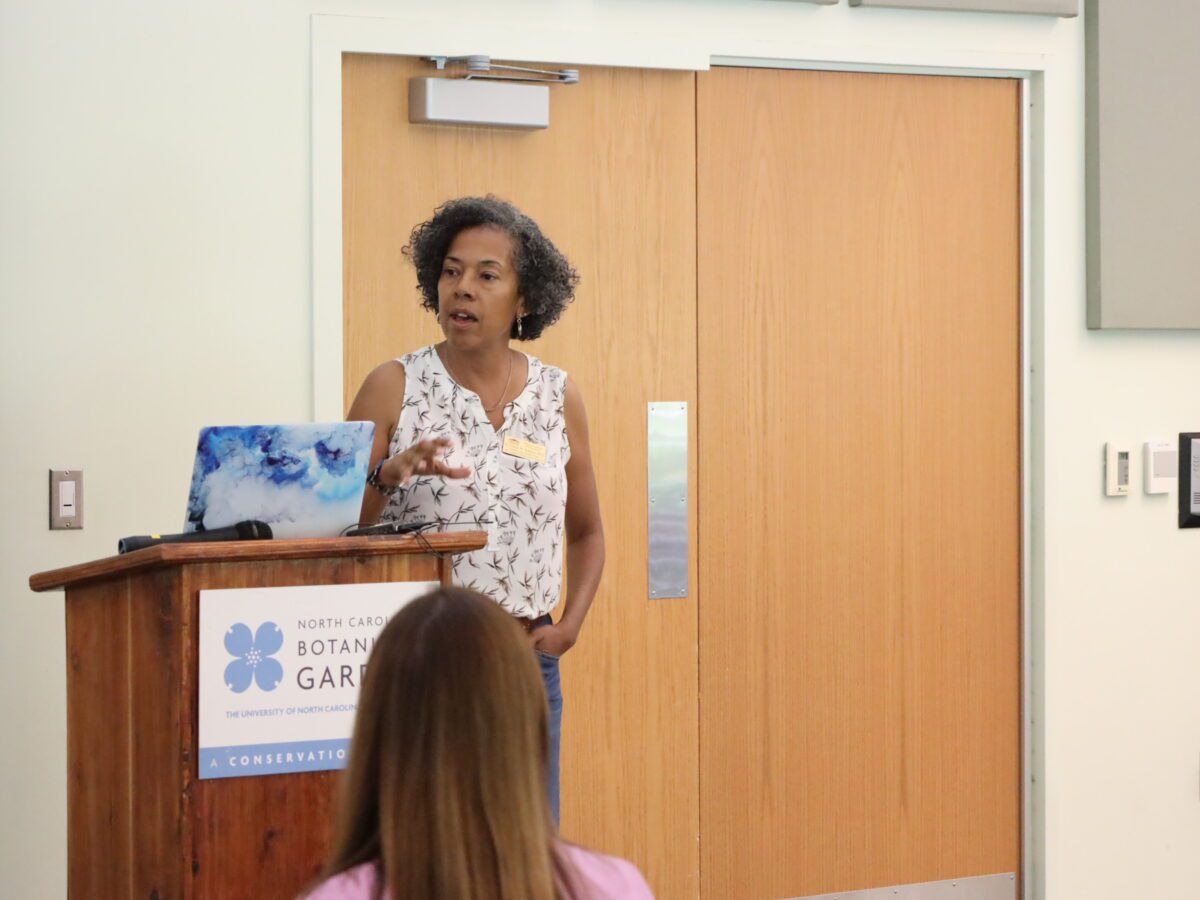

Share this story
|
|
Partners from across the state gathered in Chapel Hill on Wednesday for a meeting with members of the North Carolina Educator Pipeline Collaborative.
The collaborative works together to share and develop practices that support the recruitment and retention of a diverse and effective educator workforce. It brings together leaders from school districts, universities, and community colleges.
The Public School Forum of North Carolina launched the N.C. Educator Pipeline Collaborative in the fall of 2022. The goals of the collaborative are to:
- Identify and understand the work of successful preparation partnerships.
- Support preparation partnerships in their efforts to examine and meet their community needs.
- Consider the structures, supports, and strategies that allow partnerships to effectively recruit, prepare, support, and retain a diverse, high-quality educator pipeline.
- Share findings, recommendations, and best practices with school, district, higher education, local, and/or state leaders to develop strong educator pipelines and advocate for effective policies and programs.
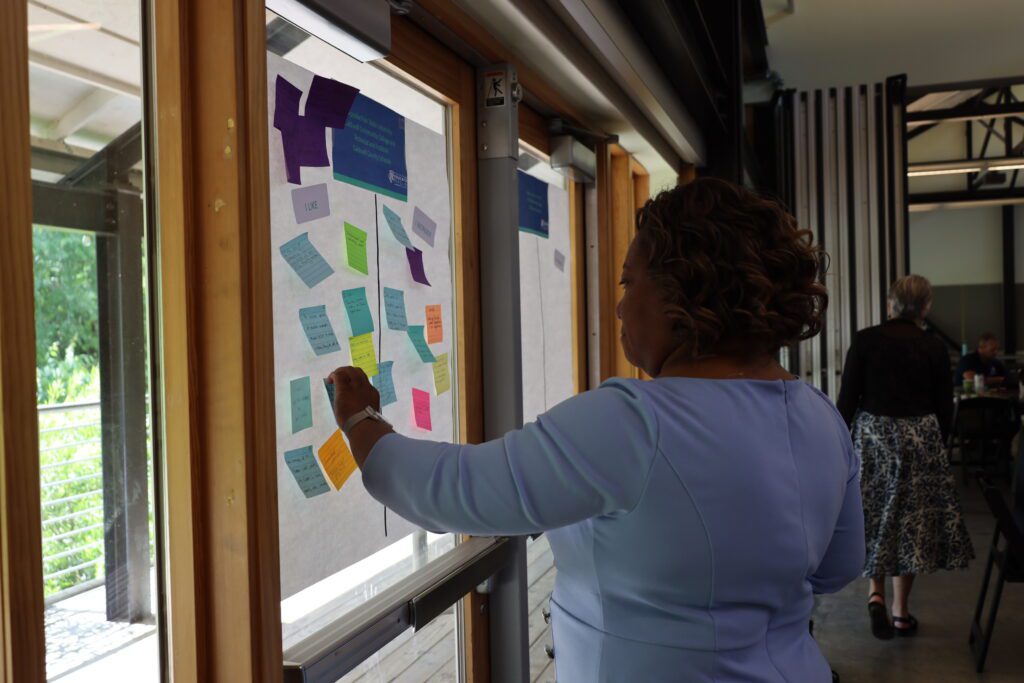

This week, each partnership shared its action plan for educating and recruiting highly effective educators in their areas. While several ideas overlapped, each partnership had specific, unique plans for their communities — based on their communities’ needs and available resources.
Prior to this, the Public School Forum prompted each partnership to create a profile of their district and community needs.
“As you know, this is truly designed to be a collaborative experience, and we know you’ve made that a priority,” Mary Ann Wolf, executive director of the forum, said. “You are a bright spot.”
Of the nine partnerships participating in the collaborative, seven presented their action plans this week. After presentations, partners provided feedback on sticky notes. Here’s a look at some of the work being done.
Action plans
Appalachian State University, Caldwell Community College and Technical Institute, and Caldwell County Schools shared their action plan for teacher recruitment and retention in Caldwell County.
“We have great partnerships in place with our community college and Appalachian State, so it was easy to come to the table,” Caldwell County Schools Superintendent Don Phipps said. “What we’ve finally been able to do is get traction and start to move things in a direction in terms of looking at our pipeline.”
The partnership is targeting three groups: teacher assistants, other classified personnel, and students. Together the three institutions are working together to ensure that no matter where a student begins, there is a seamless transition in the process.
Students who complete an associate degree at Caldwell Community College and Technical Institute are guaranteed admission to Appalachian State University, through a program called Aspire Appalachian. Caldwell County Schools plans to cover examination costs and preparation and guarantees an interview for vacant positions after completing the program.
Looking forward, these partners are exploring the idea of an early college model focused on teaching.
East Carolina University, Pitt Community College, and Pitt County Schools are providing multiple pathways for students through the Grown Your Own Pirate Educator Pipeline Model. The partnership is creating seamless transitions for students, no matter where they begin their journey toward a career in education.
K-12 students can participate in teacher cadet programs, while Pitt Community College students can gain Praxis support and personalized support. Once students arrive at ECU, they have the opportunity to choose from eight undergraduate degrees in the College of Education.
North Carolina A&T State University, Guilford Technical Community College, and Guilford County Schools identified the need to have a cohesive partnership and pathways between all three institutions. Other goals include strengthening recruitment, developing a funding framework, developing strong pathways for adult learners, and spotlighting success stories.
“What we did was look at our existing partnerships. We looked at our community, and we looked at what the needs were within our community,” Dr. Gerrelyn Patterson, chair of the department of educator preparation at N.C. A&T University, said. “Our focus is on students primarily and how we encourage our own students to go into the field of education.”
The partnership identified the need to provide separate services for high school students and adult learners. It particularly looked at recruiting high school males to pursue careers in education through a program called Blue & Gold Bus Tour: Males Exploring Pathways in Education, where more than 200 male high school students visited the N.C. A&T campus and heard from male educators who encouraged them to consider teaching.
To target adult learners, the partnership is planning to target diverse populations, military populations, and teacher assistants. The partnership is also planning to use articulation agreements to create pathways that are most advantageous to students.
Through the Bull City Teacher Scholarship program, North Carolina Central University, Durham Technical Community College, and Durham Public Schools are creating a grow-your-own teacher program in Durham. The program will provide students with up to $12,000 a year, with the promise that they’ll return to Durham Public Schools and teach for at least four years. The scholarship also covers the cost of preparation classes and tutorials for the N.C. Praxis exam.
In middle school, this partnership is beginning to identify students who are interested in careers in education by introducing them to the teacher cadet program and having eighth-grade students work as tutors at neighboring elementary schools.
“We have to help them see themselves as teachers,” Alvera J Lesane, the assistant superintendent for human resources at Durham Public Schools, said.
The partnership is also doing targeted recruiting at the middle and early colleges at Durham Technical Community College.
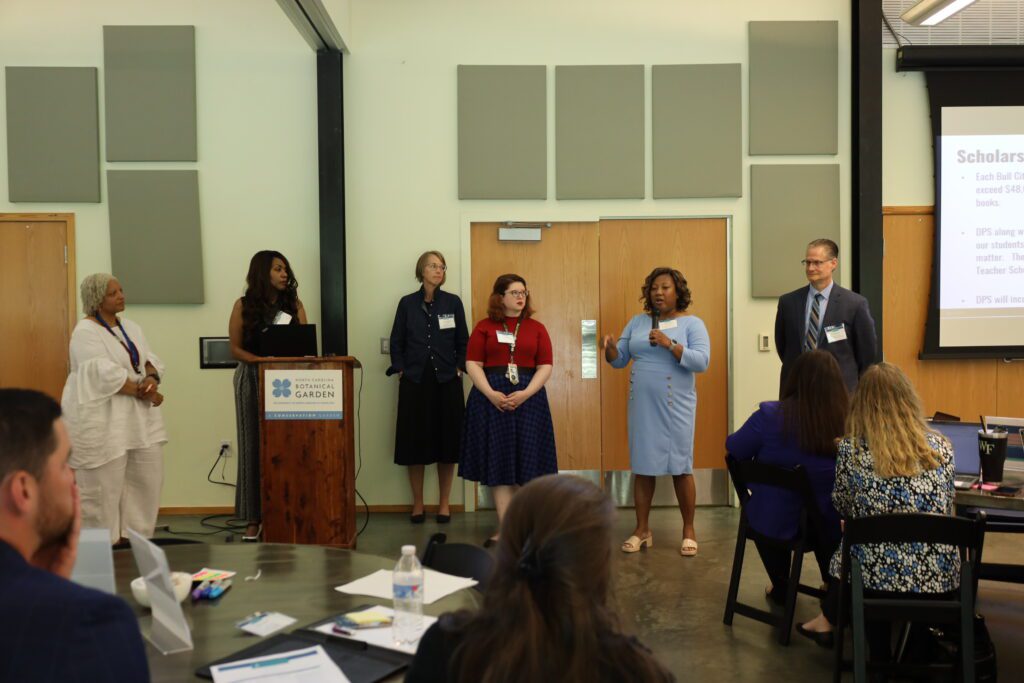

The University of North Carolina at Charlotte and Kannapolis City Schools are teaming up to collaborate on a partnership for teacher assistants to complete an associate of arts or associate of science degree and transfer to UNC Charlotte.
The partnership is prioritizing teacher assistants and other paraprofessionals in Kannapolis City Schools and is also ensuring there are articulation agreements in place for students who want to pursue a career in education and return to Kannapolis City Schools.
This partnership will offer several pathways to complete a teacher preparation program. Kannapolis will cover half of the tuition for students attending UNC Charlotte, and UNC Charlotte will offer the Cato Scholarship for candidates who complete a teacher licensure program, which will provide $3,200 per semester.
“We believe that number one is funding this and making sure that candidates who want to become teachers don’t incur a ton of debt and can complete their programs and then go into the workforce,” said Dr. Tisha Greene, assistant dean of the office of school and community partnerships and a clinical assistant professor at UNC Charlotte.
Kannapolis City Schools is also prioritizing parent and family buy-in for students who are interested in teaching careers by hosting community events to help students and families learn more about teaching.
The University of North Carolina Wilmington, Cape Fear Community College, and New Hanover County Schools are prioritizing the recruitment and retention of educators of color. In March, the partnership hosted a summit to gather data from educators, students, college and university partners, and retired teachers. Representatives from state, local, and regional organizations all attended the summit to share ideas and information.
To gather data, attendees were asked guiding questions throughout the day. Questions included:
- Why is this work important?
- What are the challenges/barriers hindering the recruitment and retention of educators of color?
After looking at the preliminary data, the partnership found that teachers feel overwhelmed and isolated. One large factor was the reported lack of a common language.
“What is coming through quite clearly is that we have we don’t have a common language for talking about pathways,” said Dr. Candace Thompson, associate dean for engagement professional learning and scholarship at UNC Wilmington. “They (educators) want it to work within their own context, to create change, to create leaders, instigators and have an informed understanding of policy.”
The partnership wants to help develop a common language and help educators feel prepared to engage with policy and this kind of work.
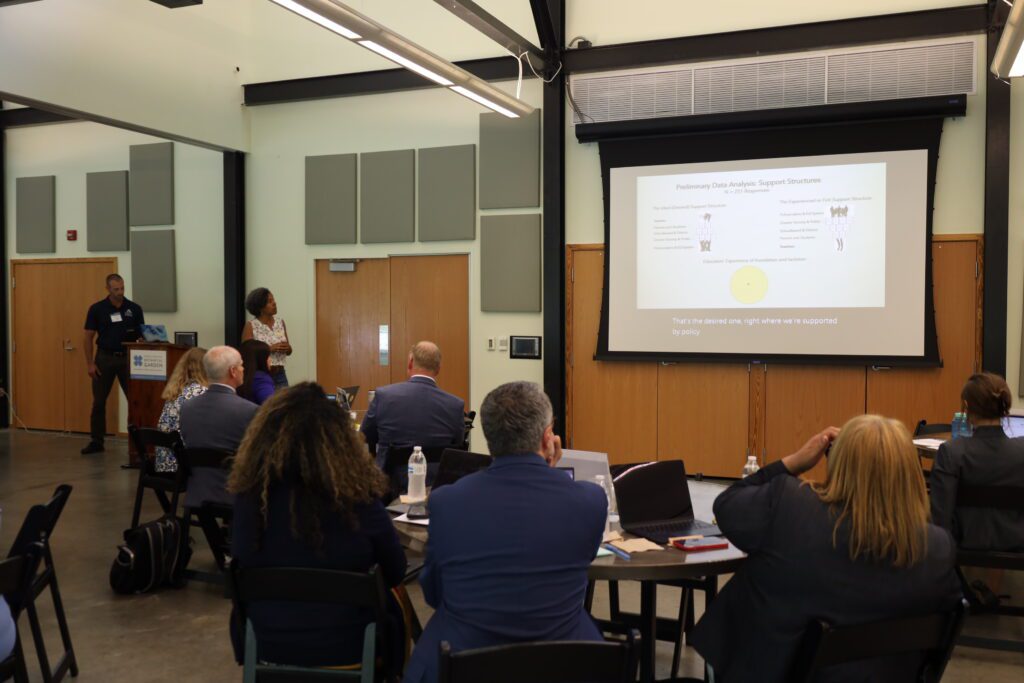

Winston Salem State University, Catawba College, Rowan-Cabbarus Community College, and Rowan Salisbury School System are developing a cohort model that would allow students to transition from one institution to the next, offering up to eight years of support for participants.
The partnership is prioritizing creating clear, accessible pathways so that across the board, students know what to expect.
“We want to be able to articulate that really clear pathway for them,” Dr. Amanda Macon, director of recruitment and induction at Rowan Salisbury School System, said. “We will write it out. This is exactly what you’re going to do in order to make this work for you.”
Macon said that creating a cohort model helps students rely on one another. It also prepares them for years down the road, when they return to Rowan Salisbury School System and already have an established support network.
Macon said that embracing flexibility will also offer students more opportunities, such as participating in pre-apprenticeships.
Next steps
The Public School Forum is hoping to launch its second cohort in 2023-24.
Until then, partnerships will participate in activities like collaborative working groups and program evaluation. Partnerships with Cohort I will advise and assist with incoming Cohort II partnerships.
Editor’s Note: A previous version of this post stated that the Public School Forum is launching Cohort II this fall. It has been corrected.
